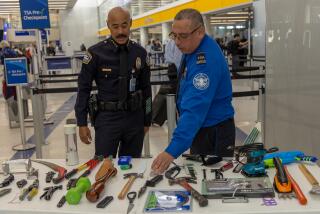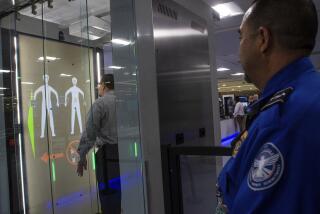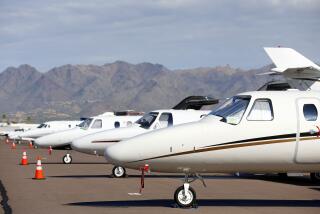TSA testing faster passenger screening program
To ease delays at airport security checkpoints, the Transportation Security Administration has launched a pilot program that lets average travelers speed to their planes without having to remove shoes, belts and coats or take laptops and liquids out of carry-on bags.
But there are a couple of drawbacks: You first have to get the OK from an explosive-sniffing dog and a TSA agent who is specially trained to detect suspicious behavior.
The program, dubbed Managed Inclusion, is being tested at the Indianapolis and Tampa international airports. TSA Administrator John Pistole said he hopes to expand the program next year. But no word yet on when it might come to a Southern California airport.
The TSA currently operates PreCheck security lines in 35 airports. The lines are reserved for pre-screened travelers who are members of an airline or hotel loyalty program or have paid $100 to enroll in a screening program through U.S. Customs and Border Protection.
The PreCheck lines move much faster than regular security lines because passengers don’t have to remove shoes, belts or coats and can leave their computers and liquid containers in their carry-on bags.
Under the new pilot program, regular travelers who do not qualify for the PreCheck program can be invited to use the faster PreCheck lines but only if they pass inspection from the dog and an officer who will ask questions to look for suspicious behavior.
“What managed inclusion means is … if there’s not many people going through the PreCheck lane and there’s a long line at the regular queue, can we somehow identify those people as being lower risk and offer them the opportunity to go through PreCheck?” Pistole said.
Taxes go beyond government coffers
If you check into a hotel in Charlotte, N.C., consider visiting the NASCAR Hall of Fame. After all, 2% of the taxes you pay for your hotel room support the facility.
Across the country, taxes charged on hotel, car rental and restaurant bills go to a variety of causes besides filling local government coffers, according to a review of travel-related taxes by the travel planning website Away.com.
In Tampa, 0.5% of hotel taxes and 0.5% of car rental taxes are used to help the homeless.
In Indianapolis, 10% of hotel taxes are used to support the Indiana Stadium and the Convention Building Authority, which built the stadium used by the NFL’s Indianapolis Colts.
In Seattle, 2% of the taxes you pay on a car rental and 0.5% of restaurant taxes support various causes, including paying off bonds for Mariners stadium, a convention center expansion and low-income housing.
But Kate Chandler, the senior editor at Away.com, said most taxes support the city or a local tourism effort.
Los Angeles, for example, collects a 14.5% tax on hotel guests — 14% of which goes to the city’s general fund and the rest goes to the state’s tourism board.
George Takei petitions for FAA rule change
If you get frustrated when flight attendants make you shut down your electronic tablet or digital reading device during takeoff and landing, George Takei has got your back.
The actor who portrayed Hikaru Sulu in the “Star Trek” television series and films is so fed up with having to turn off his gadgets on flights that he launched a petition this month on the website Change.org, calling on federal officials to reconsider the policy.
“I suspect I’m not alone in feeling put off,” Takei said in his petition letter.
He’s right. The petition has already collected nearly 17,000 signatures.
But the Federal Aviation Administration is already talking about lifting the ban on the use of personal electronic devices during takeoffs and landings. In August, the agency announced that it was forming a committee to study when such devices could be used.
One person who signed the petition commented: “This has been a pet peeve of mine. Let’s get this rule changed.”
More to Read
Start your day right
Sign up for Essential California for news, features and recommendations from the L.A. Times and beyond in your inbox six days a week.
You may occasionally receive promotional content from the Los Angeles Times.






